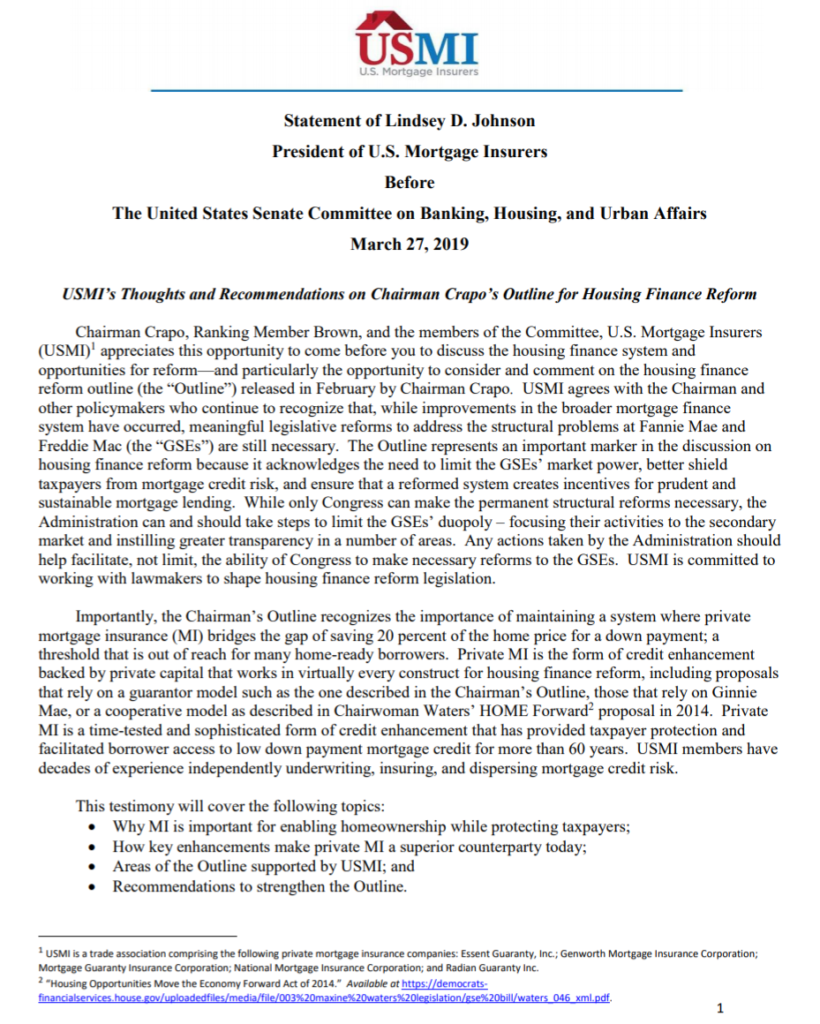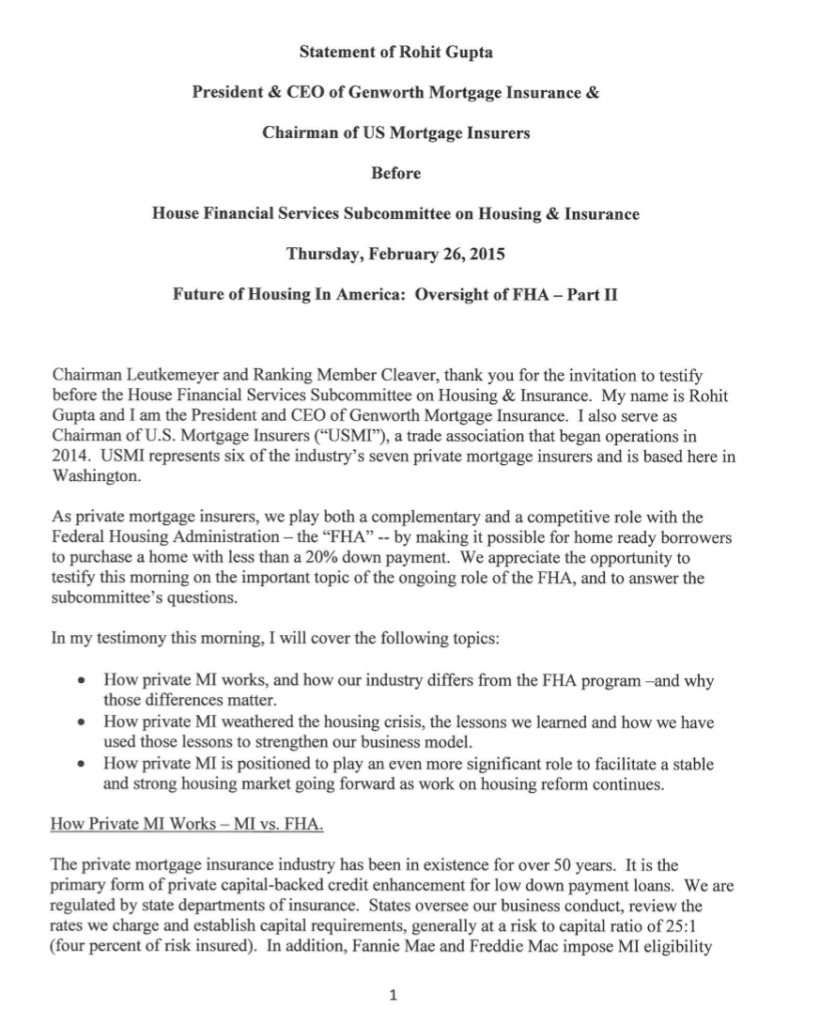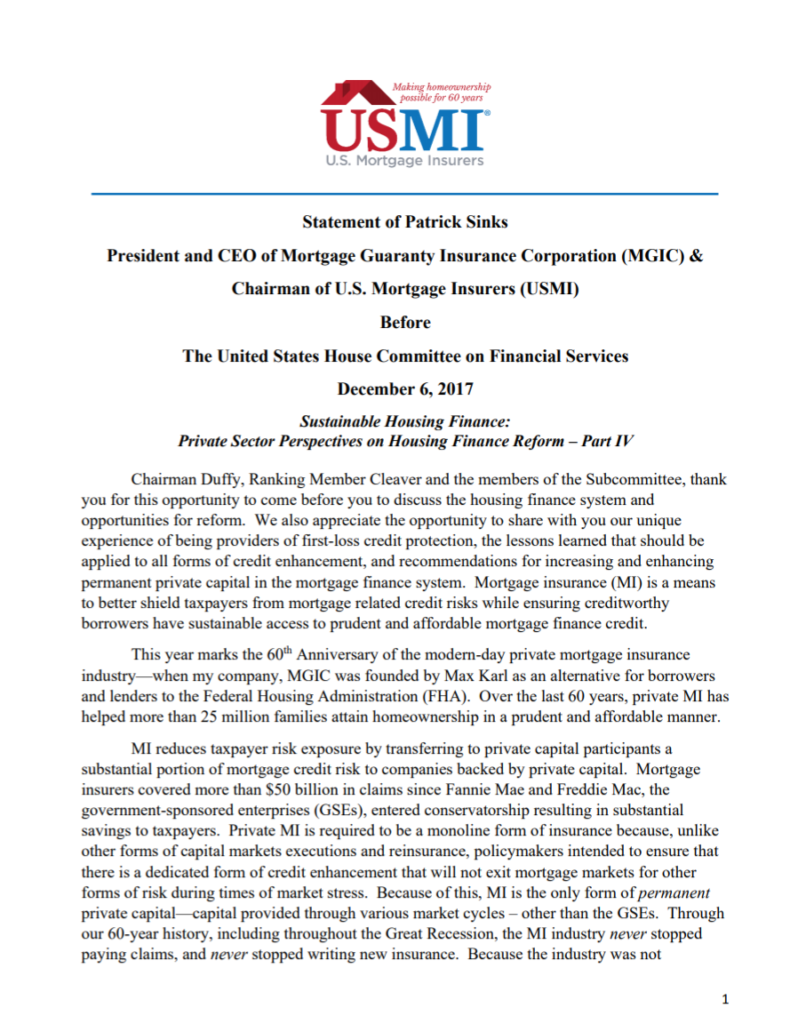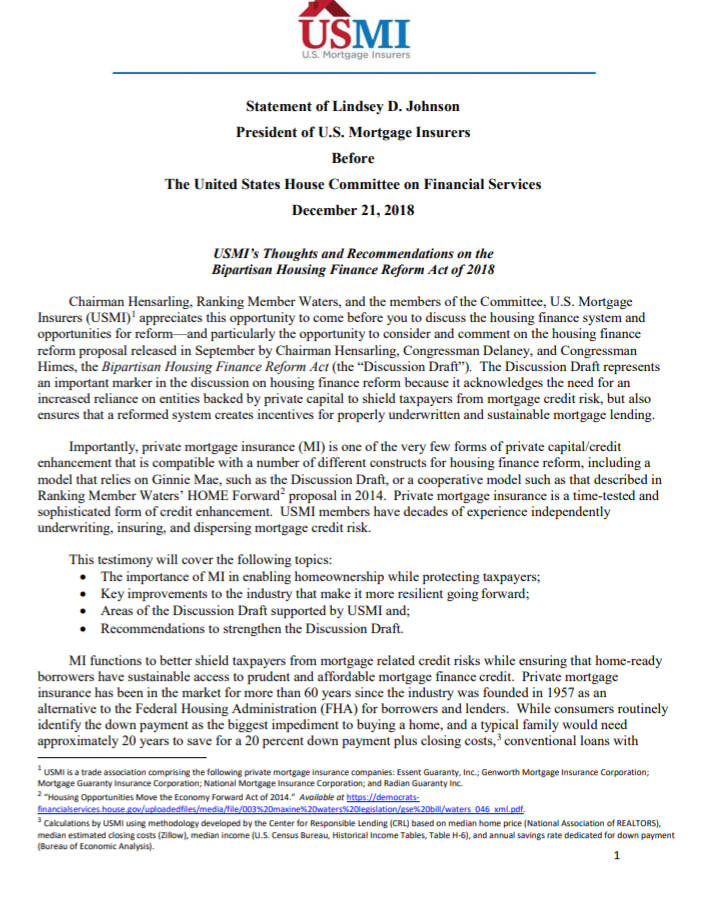Resource Filter: Testimony
Testimony: Lindsey D. Johnson before the United States Senate Committee on Banking, Housing, and Urban Affairs
Blog: Private Mortgage Insurance Plays a Critical Role Housing Finance Reform
By Lindsey D. Johnson
The year 2019 is already shaping up to be significant for the debate on the future of the housing finance system. With the Administration’s pick for Federal Housing Finance Agency (FHFA) Director Mark Calabria likely to be confirmed in the coming weeks, there has been a renewed focus on the futures of Fannie Mae and Freddie Mac (the GSEs) and the need for reforms. Just last month, Senate Banking Committee Chairman Mike Crapo (R-ID) released an outline on housing finance reform. House Financial Services Committee Chairwoman Maxine Waters (D-CA) has also detailed her legislative priorities, which includes housing reform and a particular focus on affordable housing issues. U.S. Mortgage Insurers (USMI) agrees with Chairman Crapo, Chairwoman Waters, and other policymakers who continue to see the need for meaningful reforms to address structural concerns at the GSEs. While the Administration can take steps to provide the necessary oversight of and enhancements to the GSEs, structural reform must be done by Congress.
This week, I will join other witnesses to testify on behalf of USMI on Chairman Crapo’s outline for housing finance reform and will specifically highlight the important role that private mortgage insurance (MI) plays each day to help middle-income and first-time buyers to become homeowners despite modest down payments. Not only does private MI help to provide access to mortgage credit for American homebuyers, but it also provides important protections for the overall mortgage finance system, which translates to protections for the federal government and taxpayers. Here is why private MI serves a valuable role.
MI Helps Low Down Payment Homebuyers
Private MI is a time-tested way to help borrowers qualify for low down-payment home financing. Research by the National Association of REALTORS® shows that Americans continuously cite saving for a down payment as one of the biggest hurdles for attaining homeownership and first-time homebuyers on average have a down payment of seven percent. Private MI helps bridge the gap for many borrowers to attain homeownership sooner than they otherwise would. In fact, for the past three years, private MI has been the leader in the total insured market to provide borrowers with to access to low down payment mortgage financing. All told, for over 60 years private MI has helped nearly 30 million families nationally purchase or refinance a home, with more than one million borrowers alone in 2018. Of those borrowers, nearly 60 percent of purchase loans went to first-time homebuyers and more than 40 percent of borrowers with MI had annual incomes below $75,000.
MI Protects Taxpayers and Government from Risk
Private MI not only provides affordable access to credit for homebuyers, but it also plays a critical role in protecting U.S. taxpayers from mortgage credit risk in the event of borrower defaults. Private MI serves as the first layer of protection in the conventional mortgage market against defaults that may occur on GSE-purchased mortgages. Private MI attaches to a loan the day that the loan is originated, which means that even before the lender might sell the mortgage into the GSE-backed secondary market, it is protected by private capital and therefore doesn’t directly expose the government. In this regard, when it comes to insuring low down payment mortgages, MI serves as a “second pair of eyes” on that risk. This helps ensure borrowers are placed into sustainable homeownership and adds an additional layer of protection in the mortgage finance system. This loan-level credit enhancement that attaches to the loan at origination is a feature that should be maintained in a future housing finance system.
Mortgage insurers have strong incentives to actively manage this mortgage credit risk because when a conventional-insured mortgage defaults, private MI bears the first layer of financial loss (on average 25 percent of the mortgage value). This structure of MI protection has been effective and, according to the Urban Institute, for GSE “30-year fixed rate, fully documented, fully amortizing mortgages, the loss severity of loans with private MI is 40 percent lower than that without, despite the higher Loan-to-Value of mortgages with private MI.”
It’s been over 10 years since the 2008 financial crisis, which prompted the federal government to place the GSEs into conservatorship. Comprehensive housing finance reform is long overdue and as Congress and the Administration move forward with this important work, private MI looks forward to continuing to play its invaluable role in providing access to credit and unparalleled taxpayer protection.
Testimony: Rohit Gupta before the House Financial Services Subcommittee on Housing & Insurance
Future of Housing In America: Oversight of FHA: Part II – February 26, 2015
Testimony: Patrick Sinks Before the United States House Committee on Financial Services
Testimony: Lindsey D. Johnson before The United States House Committee on Financial Services
Testimony: Chairman Patrick Sinks Before Congress on Mortgage Insurance and Sustainable Housing
Sinks Highlights Importance of Private Mortgage Insurance In Helping Borrowers Qualify for Low Down Payment Mortgages While Protecting Government Against Risk
WASHINGTON — U.S. Mortgage Insurers (USMI) Chairman and Mortgage Guaranty Insurance Corporation (MGIC) CEO Patrick Sinks today testified on behalf of USMI in front of the House Financial Services Committee’s Subcommittee on Housing and Insurance in a hearing entitled “Sustainable Housing Finance: Private Sector Perspectives on Housing Finance Reform, Part IV.”
In his testimony, Sinks highlighted the long and successful role that private mortgage insurance (MI) has played in the housing finance system to help homebuyers responsibly purchase homes with affordable low down payments – all while protecting U.S. taxpayers and the federal government from undue mortgage credit risk. Sinks also discussed the MI industry’s performance through the Great Recession and the key improvements made by the industry that make it more resilient going forward.
“Over the last 60 years, private MI has helped more than 25 million families attain homeownership in a prudent and affordable manner. MI reduces taxpayer risk exposure by transferring a substantial portion of mortgage credit risk to companies backed by private capital. Mortgage insurers covered more than $50 billion in claims since Fannie Mae and Freddie Mac entered conservatorship resulting in substantial savings to taxpayers,” said Sinks.
In addition to the important role the MI industry plays in the housing finance system, Sinks proposed specific principles for housing finance reform and lessons that should be applied to all market participants, as well as recommendations to increase the role of private capital in the housing finance system to further protect taxpayers and the government.
Acknowledging that there should be a diverse set of participants in the future to assume and protect against all mortgage credit risk ahead of an explicit government guaranty, Sinks noted that, “We believe much more can be done to reduce the risk to the federal government and make taxpayer risk exposure even more remote without jeopardizing the ability for creditworthy borrowers to continue to buy a home with mortgage financing. This includes a greater reliance on the mortgage insurance model where private capital stands in front of the government and taxpayers.”
In an August 2017 report, the Urban Institute found that GSE loans with MI consistently have lower loss severities than those without MI. In fact, the report shows that for nearly 20 years, loans with MI have exhibited lower loss severity each origination year. The Urban analysis states that “for 30-year fixed rate, full documentation, fully amortizing mortgages, the loss severity of loans with PMI is 40 percent lower than [loans] without.”
USMI President and Executive Director Lindsey Johnson echoed Sinks’ Congressional testimony today: “Private MI has been an invaluable piece of the housing finance system for a long time, decades longer than any other low down payment model being tested. Fortunately, our industry is strong and ready to shoulder an even greater responsibility in the system moving forward. Underscoring the strength of MI, the industry paid more than $50 billion in claims since the financial crisis and has implemented new higher robust capital standards. We appreciate Congress’ work to address long overdue reforms to the housing finance system and USMI members look forward to continuing and enhancing the credit risk protection MI provides to shield taxpayers from mortgage credit risk and to promote homeownership across the country.”
###
U.S. Mortgage Insurers (USMI) is dedicated to a housing finance system backed by private capital that enables access to housing finance for borrowers while protecting taxpayers. Mortgage insurance offers an effective way to make mortgage credit available to more people. USMI is ready to help build the future of homeownership. Learn more at www.usmi.org.
Testimony: The Roles Of Private MI And FHA, the Need to Strike the Right Balance for Taxpayers
For Immediate Release
February 26, 2015
Media Contacts
Robert Schwartz 202-207-3665 (rschwartz@prismpublicaffairs.com)
Michael Timberlake 202-207-3637 (mtimberlake@prismpublicaffairs.com)
USMI Testifies on the Roles of Private MI and FHA, the Need to Strike the Right Balance for Taxpayers
Rohit Gupta, President and CEO of Genworth Mortgage Insurance and Chair of U.S. Mortgage Insurers (USMI), testified before the House Financial Services Committee Housing and Insurance Subcommittee today on behalf of the private Mortgage Insurance (MI) industry. The hearing, “The Future of Housing in America: Oversight of the Federal Housing Administration, Part II” followed a February 11 hearing featuring Housing and Urban Development Secretary Julian Castro on the condition of the Federal Housing Administration (FHA) Mutual Mortgage Insurance Fund (MMIF).
Gupta’s testimony focused on the recent decision to lower annual mortgage insurance premiums at FHA, which has generated much debate on the relative roles of government and private capital in supporting homeownership while also protecting taxpayers. Potential homeowners without the ability to make a 20 percent down payment currently have two options for the mortgage insurance necessary to obtain a mortgage: either from the government-backed FHA program, or from private mortgage insurance (MI). Gupta pointed out that while these options may sound similar, from a public policy perspective, they are quite different, especially when it comes to the impact on taxpayers.
Key differences are:
- Underwriting Incentives – FHA covers virtually 100 percent of losses if a loan defaults, which may provide less incentive to ensure that loans are underwritten and serviced in a prudent and sustainable manner. By contrast, MI covers first losses down to a stated coverage percentage, creating a strong incentive for prudent underwriting and good servicing.
- Taxpayer Impact – In the wake of the financial crisis, the FHA insurance fund required $1.7 billion from U.S. taxpayers due to a capital shortfall. In contrast, MI private capital covered over $44 billion in losses on loans sold to the GSEs since they entered conservatorship, losses that otherwise would have been shouldered by taxpayers.
- Capital and Oversight Requirements – FHA capital reserve standards are lower than MI. FHA is required to be at a minimum capital ratio of 2 percent of risk insured but is currently at only a 0.41 percent capital ratio, one fifth of the two percent statutory minimum. MIs are required to be at a minimum risk to capital ratio of 4 percent, and all MIs are reporting risk to capital ratios at or above 5 percent. MI’s will be required to meet even higher capital standards under revised GSE Private Mortgage Insurer Eligibility Requirements (PMIERs) that are due to be finalized later this year.
“FHA and private MIs can and should serve as complementary forces that enable the FHA to remain focused on its fundamental mission of serving underserved markets,” said Gupta. “But for this model to work properly, it is critically important that the FHA not stray too far afield from that mission.”
“The recent decision to lower annual mortgage insurance premiums at FHA…has two immediate consequences: (1) it slows the trajectory of FHA attaining the 2% minimum capital requirement; and, (2) it limits the…return of private capital to support U.S. housing finance,” Gupta continued.
A copy of Gupta’s testimony submitted to the Committee is available here which includes a sideby-side comparison of the protections for taxpayers from MI vs. FHA.
###
U.S. Mortgage Insurers (USMI) is dedicated to a housing finance system backed by private capital that enables access to housing finance for borrowers while protecting taxpayers. Mortgage insurance offers an effective way to make mortgage credit available to more people. USMI is ready to help build the future of homeownership. Learn more at www.usmi.org.














